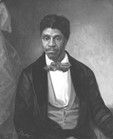The Resurgence of Birtherism and the Fight for Birthright Citizenship
- Rebecca Mollet
- Oct 14, 2020
- 5 min read

Ever since former Vice President Joe Biden announced that Senator Kamala Harris would be his running mate for the November election there has been a resurgence of birtherism. Essentially, birtherism is a movement that doubts or denies that one is a natural-born U.S. citizen, which implies that the candidate is ineligible to run for president. This movement has traditionally been promoted by conservatives and Republicans[i] who argue that not being a natural-born citizen goes against the Fourteenth Amendment of the United States Constitution. Former President Barack Obama had to address these accusations during the 2008 presidential race after Donald Trump became a prominent promoter of the conspiracy. In an effort to put an end to the the claims that he was born in Kenya, Obama released his birth certificate[ii] but the birtherism claims against him still continue.

Senator Kamala Harris now faces accusations that she is not a natural-born U.S. citizen, despite the fact that she was born in California. Harris’ mother moved the the U.S. from India before she was born and her father emigrated from Jamaica. Both of her parents are citizens. Under the Fourteenth Amendment, Harris is a citizen of the United States through birthright and also because her parents are citizens. President Trump has also promoted birther claims against Harris.[iii]
Because of the resurgence of these birther claims, it is worth studying citizenship.
One of the most significant and well-known cases that addresses citizenship is Dred Scott v. Sandford. Scott was an enslaved Black man whose owner had taken him from the slave state of Missouri to the free state of Illinois and the Wisconsin Territory. When Scott’s owner brought him back to Missouri, Scott sued for his freedom because he claimed he was no longer a slave since he had been in a free state and a free territory. The Supreme Court ruled against Scott because Black people were not considered American citizens and therefore he could not sue.[iv] Chief Justice Roger Brooke Taney wrote the majority opinion and claimed "[Black people are] regarded as beings of an inferior order, altogether unfit to associate with the white race ... and so far inferior, that they had no rights which the white man was bound to respect."[v]
The rulings of this decision were cancelled out after the Thirteenth Amendment was passed (which abolished slavery) and the Fourteenth Amendment, which guaranteed citizenship to Black people.
The Fourteenth Amendment is critical when discussing citizenship. It was passed 1868 and states "All persons born or naturalized in the United States, and subject to the jurisdiction thereof, are citizens of the United States and of the State wherein they reside".[vi] While the Fourteenth Amendment did overturn the Dred Scott decision, it still goes to show how citizenship has been a uphill battle.
The Fourteenth Amendment intentionally did not provide a pathway to citizenship to the natives, despite the amendment defining citizens as persons born in the United States.[vii] The catch was that it would only consider people it deemed subject to its jurisdiction, which excluded natives from even being considered. So while the Fourteenth Amendment was perceived as progressive, it still had regressive elements that promoted inequality.

One of the most historic decisions about birthright citizenship is United States v. Wong Kim Ark. Wong had arrived on a ship in California after visiting China. He carried with him his certification that he was a citizen of the United States. Even though his parents were Chinese he was an American because he was born on American soil. Despite this, authorities denied him entry because they were enforcing the Chinese Exclusion Act. This act banned all Chinese workers from entering the United States. Wong stayed on the ship for four months because he was not allowed to enter the country. When the case made it to the Supreme Court it was confirmed that the Fourteenth Amendment did mean that being born in the United States makes a person an American citizen.[viii] Justice Salyer wrote “to hold that the Fourteenth Amendment of the Constitution excludes from citizenship the children, born in the United States, of citizens or subjects of other countries would be to deny citizenship to thousands of persons of English, Scotch, Irish, German, or other European parentage who have always been considered and treated as citizens of the United States.”[ix] This decision guaranteed birthright citizenship to all children that were born in America and set a precedent for what birthright citizenship was. This implied that while there were groups that were casted as “other”, they were still citizens. So while they may not have fit in with the Americanized idea of a citizen, under the law they were considered a citizen of the United States.
In the early twentieth century birthright citizenship was not challenged as frequently as it had been previously. This is because many politicians saw it as a settled cause due to the Fourteenth Amendment and Supreme Court decisions. The issue became more prominent in the nineties when Democratic Senator Harry Reid introduced a bill that would end birthright citizenship. The bill, known as the Immigration Stabilization Act, went against the Fourteenth Amendment. Reid stated on the Senate floor in 1993 “if making it easy to be an illegal alien isn’t enough, how about offering a reward to be an illegal immigrant. No sane country would do that, right?” Senator Reid now says that introducing this piece of legislation was a mistake.[x] This bill died in committee, but it’s introduction may be partially responsible for some of the anti-birthright arguments we hear today.
Those in favor of ending birthright citizenship argue that the language of the Fourteenth Amendment is not clear on whether simply being born in the United States is enough to provide citizenship. The words “and subject to the jurisdiction thereof” are not explicit, according to some. Those in favor of revoking birthright citizenship argue that Congress could pass legislation defining what that phrase means, since the Supreme Court has never ruled on whether or not it specifically applies to people who are in the country illegally.[xi]
There is a common misconception that the United States is the only country in the world to offer birthright citizenship when in reality over thirty countries give citizenship to people born on their soil.[xii] This concept is known as jus soli. Providing birthright citizenship has been considered by many as a means to establish authority. In addition, if birthright citizenship were terminated in the United States, there may be a human rights crisis because without citizenship documents people would be stateless and would be unable to go to school or work. For example, the Dominican Republic ended birthright citizenship and this resulted in 200,000 stateless people; 60,000 of which were children.[xiii]
This issue still remains controversial, especially since there has been a common trend in recent years of candidates using immigration as their platform. Birthright citizenship is now a partisan issue and Democrats and Republicans cannot seem to come to an agreement. One thing is for certain, due to a surge in contention, this is not an issue that will be resolved any time soon.
[i] https://www.sciencedirect.com/science/article/pii/S026137941400105X [ii] https://web.archive.org/web/20080922222958/http://fightthesmears.com/articles/5/birthcertificate [iii] https://www.npr.org/2020/08/13/902362014/trump-and-his-campaign-amplify-birther-conspiracy-against-kamala-harris [iv] Finkelman Paul. Dred Scott v. Sandford: A Brief History with Documents. Boston: Bedford Books, 1997. [v] https://www.loc.gov/resource/llst.022/?st=gallery [vi] https://www.law.cornell.edu/supremecourt/text/60/393 [vii] http://blog.constitutioncenter.org/2015/06/on-this-day-in-1924-all-indians-made-united-states-citizens/ [viii] https://www.washingtonpost.com/history/2018/10/30/birthright-citizenship-trump-inspired-history-lesson-th-amendment/ [ix] https://www.law.cornell.edu/supremecourt/text/169/649 [x] https://www.washingtonpost.com/politics/2018/10/31/harry-reid-once-said-no-sane-country-would-allow-birthright-citizenship-he-regrets-it-again/ [xi] https://digital.library.unt.edu/ark:/67531/metacrs9011/ [xii] https://worldpopulationreview.com/country-rankings/countries-with-birthright-citizenship [xiii] https://www.washingtonpost.com/world/2018/10/30/trump-says-no-other-country-has-birthright-citizenship-hes-wrong/












コメント